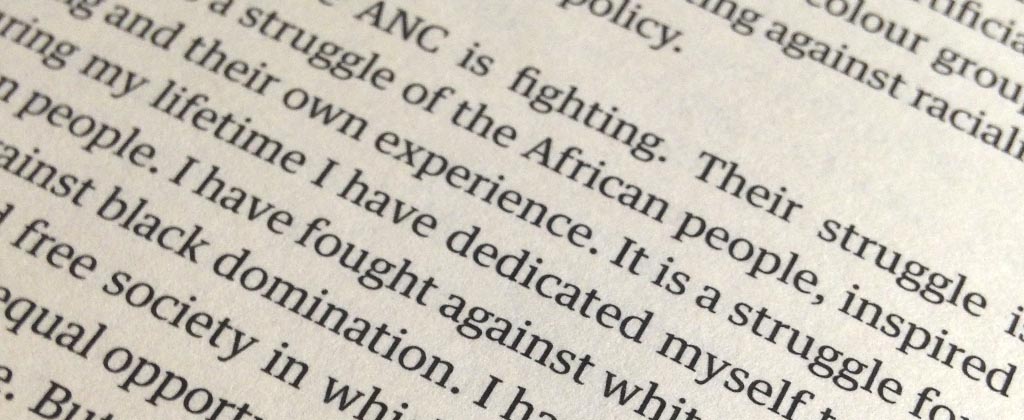Great Speeches: Nelson Mandela - April 20th 1964
This post is part of a Series on Great Speeches. In 2007 The Guardian published a series of booklets, with accompanying cd, entitled Great Speeches of the 20th Century, ranging from Winston Churchill to Nelson Mandela, Emmeline Pankhurst to Virginia Woolf.
Nelson Mandela delivered this speech from the dock of the Supreme Court of South Africa, in what became known as the Rivonia Trial in 1964.
From 1961 the actions of the ANC were to turn increasingly violent as peaceful means of protest were exhausted. Already in prison since 1962 for ‘inciting workers to strike’, Mandela was again arrested and charged with 9 others, for offences relating to 'the preparation and use of explosives and in guerrilla warfare for the purpose of violent revolution and committing acts of sabotage'.
A lawyer by training, he was no stranger to the Courtroom. It’s been said that he delivered his speech, reported to have lasted anywhere from 3 - 5 hours, looking the Judge full in the face. Knowing the death penalty was the likely sentence, Mandela set out his position at length and concluded by saying -
During my lifetime I have dedicated my life to this struggle of the African people. I have fought against white domination, and I have fought against black domination. I have cherished the ideal of a democratic and free society in which all persons will live together in harmony and with equal opportunities. It is an ideal for which I hope to live for and to see realised. But, my Lord, if it needs be, it is an ideal for which I am prepared to die.
The trial was condemned around the world and led to sanctions against South Africa. In the US, less than a year earlier Martin Luther King had made his 'I Have A Dream' speech and continued, in the face of ignorance and aggression, to pursue a path of non-violence. Yet, even in that context, FW de Klerk - not in power himself until 1989 - writes that Mandela's speech was "received with indifference by the National Party government”.
With the experience of a lawyer setting out his case, Mandela had detailed methodically the efforts of the ANC to appeal peacefully to the government for change. He had carefully outlined what was his “calm and sober assessment of the political situation that had arisen after many years of tyranny, exploitation, and oppression".
Rather than apologise for the actions of the accused, he makes the case for violence. He explains why and how the means of their protest turned from resistance to sabotage, speaking at length of “legislation designed to preserve white supremacy”, and speaks boldly of the daily indignities and brutalities suffered by the African people. And yet, Mandela spoke to a system so deeply prejudiced that his speech may as well have been in another language.
However, whilst his speech may have been received with indifference, it did influence his sentencing. Perhaps unwilling to make a martyr of this man, and his co-accused, the Judge sentenced them to life imprisonment. Although it led to a gruelling 27 years in prison, Mandela continued to be the figurehead and leader of his cause. Ultimately he triumphed to become President in 1994. He wasn't destined to die for his ideals after all, but to see them realised - at least in part.

